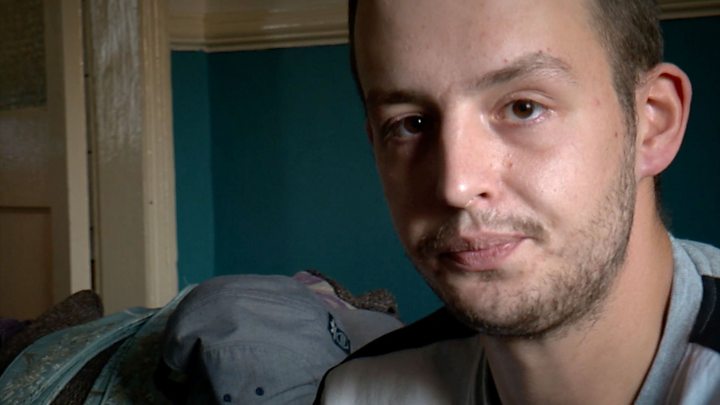‘I didn’t think gaming could lead to compulsive gambling’
As the NHS opens a clinic for young gaming and gambling addicts, the father of one tells his story. …


The NHS has opened its first clinic for young people addicted to gaming and gambling, a year after a Gambling Commission report found that 55,000 11-to-16-year-olds in the UK were problem gamblers. For some the path to gambling begins with playing online games, as the BBC’s Becky Milligan heard from the father of one young man now getting help for his addiction.
“Not in a million years, not in a million years did I think that gaming could lead to compulsive gambling.”
Steve is sitting on a bench in a churchyard. He’s agreed to talk to me about his son’s gambling addiction. He’s nervous, he hasn’t done an interview before and I can feel his anxiety.
His son, now in his early 20s, is in recovery and doing well, “but we take one day at a time” he says.
“We’ve had a terrible three years. We wouldn’t want anyone to go through what we have gone through. When we first discovered our son had the compulsive gambling disorder we didn’t know what to do.”
Steve tells me how one night his son lost his weekly wage in a matter of minutes. Distraught, he appealed to his parents for help. They did what many other parents would do: They paid off his debt, hoping that would be end of it. But it wasn’t.
I tell Steve that I’ve spoken to other parents whose children have developed gambling disorders, and they also paid off the debts at first, not realising the extent of their children’s addiction.
“We thought this was just a little glitch, this is what kids do,” one father told me. And that’s what Steve thought at first.
He and his wife had known for some time that their son enjoyed having the odd bet. But lots of their friends enjoyed a flutter and it didn’t seem to be out of the ordinary.
A year later, though, Steve was shocked to find out his son was gambling with other people’s money, and losing large amounts.
“It was online roulette. That was his downfall,” he tells me.
Now Steve realised it was a very serious problem. He and his wife didn’t know what to do. They began to isolate themselves, avoid going out or seeing friends. They were worried what people would say.
“We were pretty helpless. We didn’t know which way to turn. We spent months finding the answers and doing our own research,” Steve says.
Last year, he and his wife went to a GamAnon meeting for families. Earlier this year his son also began to get help.
Find out more
Becky Milligan’s reports on teenage gamblers can be heard on the PM programme this week, from Tuesday to Thursday, after 17:00 on BBC Radio 4
You can also listen now on BBC Sounds:
Steve has had a few months to do a great deal of research and he now believes his son’s addiction was sparked when he was 12 or 13 and was obsessed with playing online games, particularly football games.
He would play for hours and hours in his bedroom, Steve tells me, and all his mates were into to it as well. Steve didn’t really understand what the games were about, let alone the new technology the games used. And anyway, at least his son was occupied, he says.
“We all want an easy life, a quiet life. Parents can be lazy. If he was playing upstairs I would think, ‘It’s not doing any harm is it?'”
Steve now thinks that the football games promoted habits, including spending hours online, that “developed into gambling”.
Crucially, Steve’s son was encouraged to pay for extra products, such as “ultimate team packs”.
The identities of the players in these packs would only be revealed once he had paid, which Steve says introduced his son to the “thrill of gambling”, the game of chance and risk – including the chance of acquiring a star player who would make him unbeatable.
Steve thinks the difference between online gaming and gambling is very subtle, and that those children who excessively game online, like his son, are at risk of becoming compulsive gamblers later in life. It doesn’t matter, he says, whether the game involves winning or losing real money.
Dr Henrietta Bowden-Jones, a psychiatrist at the new NHS treatment centre, says no link between gaming-related activities “that may be toxic for young people” and gambling has yet been established. It’s currently a “big controversial conversation”, she says.
“I believe so little is known in this country about both these behavioural addictions in children, that we need to hear it on the ground, we need to understand what these people are doing then work with policy makers, politicians and public health professionals to change the environment they live in,” she told the BBC.
Where to get help
BigDeal (for children and young people)
It has been a very hard few years for Steve and his family. He recently decided to leave his teaching job and set up a charity, GamFam, to help other parents who might be in a similar position.
However complicated it is, Steve says that parents need to know what their children are doing online, they need to become the experts in order to protect them.
“Do research, put the barriers in place, take control of the device, set up family time. Screen [the child’s activity] so that you are in control of what’s going on. And most importantly do not have any of your credit cards, debit cards linked to the account,” he says.
“There are horror stories where children are spending excessive amounts of money on in-game purchases. Many of these games promote themselves as free games but the loot boxes in the games [are not].”
Like the “ultimate team packs” that Steve’s son used to buy, loot boxes may contain virtual items such as weapons or shields that help a player win the game – and gamers don’t know what’s in them until they have bought them.
MPs on the Digital, Culture, Media and Sport committee recently recommended that the sale of loot boxes should be regulated as gambling, and that selling them to children should be banned entirely.
In a statement to the BBC, the association for UK interactive entertainment, Ukie, echoed Steve’s call for parents to monitor their children’s behaviour online.
“Alongside robust age-ratings for games, all major consoles and mobile devices offer smart and simple parental controls. Above all, we recommend that parents and carers engage directly with players, talk to them about the games they are playing and even join in,” the statement said.
Wes Himes, chief executive of the Remote Gambling Association, said it was very difficult for children to get through the verification process to gamble online. He added that the industry was not allowed to advertise near schools, or to target under-25s with its advertising.
Steve Ginnis of Ipsos Mori, however, told the BBC that focus groups conducted by his company showed that children and young people found aspects of existing gambling advertisements appealing – “in terms of promotional offers and use of celebrities and presenting it as fun or skilful”.
‘Part of the game’
Stewart Kenny, the Paddy Power founder who resigned in 2016 over what he saw as the failure to tackle problem gambling, says advertising is “normalising” gambling for children, and that it has become “nearly part of the game” when watching football.
“That is dangerous, because it is promoted by well-known people, it’s a constant barrage of advertising they see it before, during and after the match… It’s become normal for children to think gambling and soccer are the same thing.”
Steve says his family is now doing better. His son’s last bet was in February. They are not ashamed any more about what happened, but in order to protect his son, Steve doesn’t want to give his full name.
He hopes his new charity will be able to visit schools and talk to parents.
Steve says the problem of children’s gambling addiction has to be addressed. If nothing is done, he believes we will have an “epidemic on our hands of catastrophic proportions”.
At present, he says, the only help these youngsters have got is their parents.
“For me, if I don’t do this now, then I will never do it, I feel it is a calling, I need to do, I need to be putting the message out there and support the parents. I wouldn’t wish what we have been through on my worst enemy.”
You may also be interested in:

Media playback is unsupported on your device




